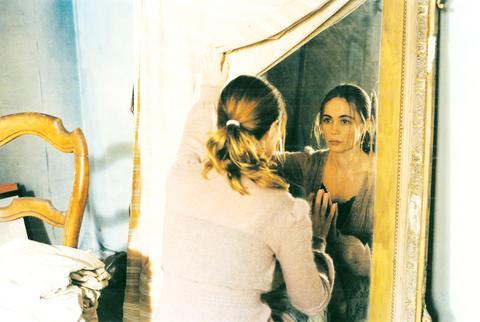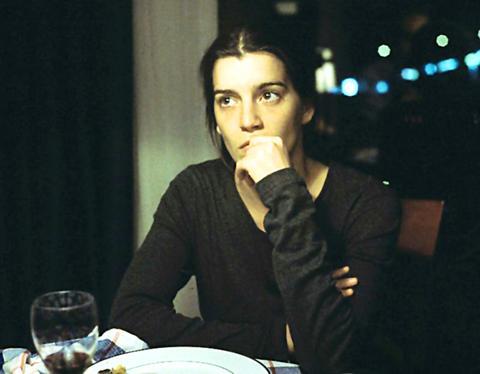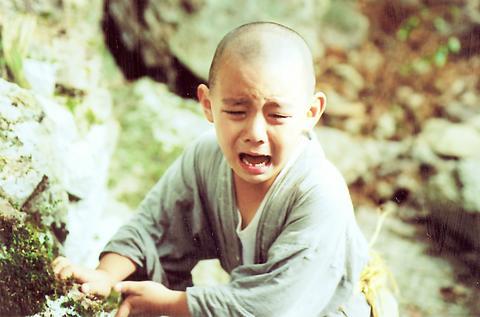Starting this Sunday, movie fans are in for a Spanish treat. Organizers of the Taipei Film Festival (
In addition to 50 Spanish films, there will be 50 Chinese-language and Asian films shown at the festival's three venues, which are at Zhongshan Hall (

Including the famed Pedro Almodovar and surrealist master Luis Bunuel, there will be 10 important Spanish directors introduced in the programs.

First off, Luis Bunuel, the original Spanish filmmaking master, will have two of his films showcased at the festival. Viridiana is a film about a novice nun being fooled by the beggars she shows charity to. The film was banned in Spain on the grounds of blasphemy, though it won the Palme d'Or at the Cannes Film Festival. Tristana is an Oscar-nominated film starring Catherine Deneuve which is an allegorical story about a beautiful girl exploited and seduced by her benefactor.
Pedro Almodovar is well-known for his expressiveness with color, for the photographic quality of his films and, of course, his celebration of love and desire (albeit in some bizarre forms).

TFF has selected six of Almodovar's earlier works and these show more of his daring talents than his later commercial works do. These early works include Pepi, Luci, Bom, about rape, revenge, lesbianism and S/M; Matador, about the relationship between love, desire and murder; and Women On the Verge of Nervous Breakdown, about three women driven mad by their absent boyfriends.

Almodovar could not make the trip to Taipei as he is working on his new film, but he donated his personal collection of out-of-print posters for two of his films, Laws of Desire and Women On the Verge of Nervous Breakdown.
Apart from these two filmmakers, the festival will feature a work by Carlos Saura, the filmmaking master who combines flamenco dance with surrealist cinematography. Saura's 2002 work Salome has been selected as the opening film for TFF.

For fans of Victor Erice, the filmmaker who comes out with a masterpiece every 10 years, they will get to see three of his works from the 1970s to 1990s: The Spirit of the Beehive, The South and Quince Tree of the Sun.

For movie-goers who might wish to see what a propaganda movie written by the dictator General Francisco Franco is like, TFF organizers have dug up the 1942 film Race.
For younger filmgoers, there is the romantic love story The Lovers of the Arctic Circle, by director Julio Medem. There is also the debut film Thesis from Alejandro Amenabar (director of Open Your Eyes, The Others). The film is a thriller about young women studying violent movies.

Also, there's the winner of the 2003 Goya Awards (Spain's answer to the Oscars), Mondays in the Sun, a story about a day in the life of a group of unemployed men in an industrial city of Northern Spain. It is a film, pregnant with humor and thoughtful asides, made by the 34-year-old Fernando Leon de Aranoa.

If the Spanish movies are not to your taste, then TFF is also presenting Chinese dishes, such as the Taiwanese film Formula 17, a gay romantic comedy which is the opening film for the screening segment dubbed "New Age of Independents: Global Chinese Films." In this section, there are seven independent or underground Chinese films. The big gap in wealth between the city and the country, and lost young people struggling for identity and a better life are the two main themes for these films.
Chen Mo and Meiting (

South Korea's Kim Ki-duk is showing two films: The Coast Guard and Spring, Summer, Fall, Winter ... and Spring. The former is about a soldier in the demilitar-ized zone who mistakenly shoots a drunken civilian having sex with his lover. He is thus traumatized and haunted by the image of the killing. The latter film is Kim's recent highly praised work, which strays from his usual theme of violence and instead presents a more tender picture of existence. The film describes a monk's life, how he breaks the rules (submits to the temptation of desire) and later commits murder. Each episode expresses a zen-like feeling yet Kim still maintains a strong visual charm, telling a quiet, yet visually exciting story.

What: Taipei Film Festival
When: March 21 to April 3
Where: Zhongshan Hall, 98 Yenping S Rd, Taipei (¥x¥_¥«©µ¥«n¸ô98¸¹)
Metropolitan Hall, 25 Bade Rd, Sec 3, Taipei (¥x¥_¥«¤K¼w¸ô¤T¬q25¸¹)
President Cinema, 4F, 59 Zhonghua Rd, Sec 2, Taipei (¥x¥_¥«¤¤µØ¸ô¤G¬q59¸¹4¼Ó)
How much: Tickets are NT$150 if purchased by March 21, NT$180 during the festival period, from Acer ticketing outlets.
More information about the program is available at Eslite Bookstore, or go to www. tiff.org.tw

Taiwan has next to no political engagement in Myanmar, either with the ruling military junta nor the dozens of armed groups who’ve in the last five years taken over around two-thirds of the nation’s territory in a sprawling, patchwork civil war. But early last month, the leader of one relatively minor Burmese revolutionary faction, General Nerdah Bomya, who is also an alleged war criminal, made a low key visit to Taipei, where he met with a member of President William Lai’s (賴清德) staff, a retired Taiwanese military official and several academics. “I feel like Taiwan is a good example of

March 2 to March 8 Gunfire rang out along the shore of the frontline island of Lieyu (烈嶼) on a foggy afternoon on March 7, 1987. By the time it was over, about 20 unarmed Vietnamese refugees — men, women, elderly and children — were dead. They were hastily buried, followed by decades of silence. Months later, opposition politicians and journalists tried to uncover what had happened, but conflicting accounts only deepened the confusion. One version suggested that government troops had mistakenly killed their own operatives attempting to return home from Vietnam. The military maintained that the

Before the last section of the round-the-island railway was electrified, one old blue train still chugged back and forth between Pingtung County’s Fangliao (枋寮) and Taitung (台東) stations once a day. It was so slow, was so hot (it had no air conditioning) and covered such a short distance, that the low fare still failed to attract many riders. This relic of the past was finally retired when the South Link Line was fully electrified on Dec. 23, 2020. A wave of nostalgia surrounded the termination of the Ordinary Train service, as these train carriages had been in use for decades

Lori Sepich smoked for years and sometimes skipped taking her blood pressure medicine. But she never thought she’d have a heart attack. The possibility “just wasn’t registering with me,” said the 64-year-old from Memphis, Tennessee, who suffered two of them 13 years apart. She’s far from alone. More than 60 million women in the US live with cardiovascular disease, which includes heart disease as well as stroke, heart failure and atrial fibrillation. And despite the myth that heart attacks mostly strike men, women are vulnerable too. Overall in the US, 1 in 5 women dies of cardiovascular disease each year, 37,000 of them